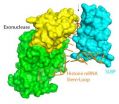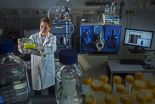Feed a cold, starve a fever…. and your worms!
Adaptive immunity alters distinct host feeding pathways during nematode induced inflammation, a novel mechanism in parasite expulsion
2013-01-18
(Press-News.org) Contact:Gina Alvino
(415) 568-3173
plospathogens@plos.org
Disclaimer
This press release refers to an upcoming article in PLOS Pathogens. The release is provided by the article authors. Any opinions expressed in these releases or articles are the personal views of the journal staff and/or article contributors, and do not necessarily represent the views or policies of PLOS. PLOS expressly disclaims any and all warranties and liability in connection with the information found in the releases and articles and your use of such information.
Media Permissions
PLOS Journals publish under a Creative Commons Attribution License
(http://creativecommons.org/licenses/by/2.5/), which permits free reuse of all materials published with the article, so long as the work is cited (e.g., Kaltenbach LS et al. (2007) Huntingtin Interacting Proteins Are Genetic Modifiers of Neurodegeneration. PLoS Genet 3(5): e82. doi:10.1371/journal.pgen.0030082). No prior permission is required from the authors or publisher. For queries about the license, please contact the relative journal contact indicated here: http://www.plos.org/about/media-inquiries/.
About PLOS Pathogens
PLOS Pathogens (www.plospathogens.org) publishes outstanding original articles that significantly advance the understanding of pathogens and how they interact with their host organisms. All works published in PLOS Pathogens are open access. Everything is immediately available subject only to the condition that the original authorship and source are properly attributed. Copyright is retained by the authors. The Public Library of Science uses the Creative Commons Attribution License.
About the Public Library of Science
The Public Library of Science (PLOS) is a non-profit organization of scientists and physicians committed to making the world's scientific and medical literature a freely available public resource. For more information, visit http://www.plos.org.
ELSE PRESS RELEASES FROM THIS DATE:
2013-01-18
The pattern of blood flow in the prefrontal cortex in the brains alters with age during multi-tasking, finds a new study in BioMed Central's open access journal BMC Neuroscience. Increased blood volume, measured using oxygenated haemoglobin (Oxy-Hb) increased at the start of multitasking in all age groups. But to perform the same tasks, healthy older people had a higher and more sustained increase in Oxy-Hb than younger people.
Age related changes to the brain occur earliest in the prefrontal cortex, the area of the brain associated with memory, emotion, and higher decision ...
2013-01-18
Using data collected about Labrador Retrievers, research published in BioMed Central's open access journal BMC Veterinary Research is beginning to quantify the health, illnesses, and veterinary care of dogs.
The UK is a nation of pet lovers – but what do we know about the health of our pets? To date the long term (longitudinal) study of canine diseases has been patchy, relying on information from referral centers and details about pet illnesses which are not reported to a vet have never been studied before.
The Dogslife internet-based project was organized in conjunction ...
2013-01-18
The dwindling reserves of fuelwood in Africa have been illuminated in a new study published today, which shows a bleak outlook for supplies across savannas in South Africa.
Presenting their findings in IOP Publishing's journal Environmental Research Letters, researchers have found that at current consumption levels in the communal areas of Lowveld, South Africa, reserves of fuelwood could be totally exhausted within 13 years.
The consequences are significant, with around half of the 2.4 million rural households in the country using wood as their primary fuel source, ...
2013-01-18
(Embargoed) CHAPEL HILL, N.C. – Histone proteins are the proteins that package DNA into chromosomes. Every time the cell replicates its DNA it must make large amounts of newly made histones to organize DNA within the nucleus.
An imbalance in the production of DNA and histones is usually lethal for the cell, which is why the levels of the messenger RNA (mRNA) encoding the histone proteins must be tightly controlled to ensure the proper amounts of histones (not too many and not too few) are made.
In a collaborative effort published online in the January 18, 2013 issue ...
2013-01-18
WINSTON-SALEM, N.C. – Jan. 17, 2013 – Farmworkers are at potential risk from food and waterborne illnesses because of the condition of cooking and eating facilities available to them, according to a new study from Wake Forest Baptist Medical Center.
Researchers from Wake Forest Baptist are the first to evaluate cooking and eating facilities in migrant farmworker camps to compare against established housing regulations. They found that the facilities fail to comply with regulations in a substantial number of camps. The study, which appears online today in the January issue ...
2013-01-18
In contrast to climate change, there is no coordinated global system in place for measuring and reporting on biodiversity change or loss. An international team of biologists is now addressing this gap.
In Science today, 30 researchers led by Henrique Miguel Pereira, from the Centre for Environmental Biology of the University of Lisbon, proposed a global biodiversity monitoring system based on a set of essential variables.
By determining the most essential measurements to accurately and usefully report on biodiversity loss, known as essential biodiversity variables (EBVs), ...
2013-01-18
Scientists from The University of Manchester have discovered that weight loss plays an important role in the body's response to fighting off intestinal worms.
The findings have been published in the journal PLOS Pathogens and show that the immune system hijacks the natural feeding pathways causing weight loss. This then drives the defense mechanisms down the correct pathway to expel the worms.
Nearly one quarter of the world's population is infected with gastrointestinal parasites. These prevalent infections often result in a period of reduced appetite resulting in ...
2013-01-18
This press release is available in German.
Immune cells constantly patrol our body to check for foreign invaders, such as bacteria or viruses. To do so they leave the blood stream, actively crawl through tissues and finally re-enter the circulation via lymphatic vessels. Research from the laboratory of Michael Sixt elucidates how the cells are guided through tissues like the skin. It is thought that cells either sense their environment by 'touching' or 'smelling': They adhere to structural molecules like connective tissue proteins using adhesion receptors. Or ...
2013-01-18
Gas separation is crucial for many industrial processes including obtaining nitrogen or oxygen from air and purifying natural gas or hydrogen. Currently, the most energy efficient method for separating gases involves polymer membranes, however, most polymers either let gases pass through slowly (i.e. have low permeability) or are not selective towards one gas over another. Gas separation would be cheaper and use less energy if polymer membranes could be made both highly permeable and selective.
A team from the University's School of Chemistry reports in the journal Science ...
2013-01-18
This press release is available in German.
Toronto -- Early life exposure to normal bacteria of the GI tract (gut microbes) protects against autoimmune disease in mice, according to research published on-line in the January 17 edition of Science. The study may also have uncovered reasons why females are at greater risk of autoimmune diseases such as multiple sclerosis, rheumatoid arthritis, and lupus compared to males.
Researchers from The Hospital for Sick Children (SickKids) found that when female mice at high risk of autoimmune (type 1) diabetes were exposed ...
LAST 30 PRESS RELEASES:
[Press-News.org] Feed a cold, starve a fever…. and your worms!
Adaptive immunity alters distinct host feeding pathways during nematode induced inflammation, a novel mechanism in parasite expulsion


